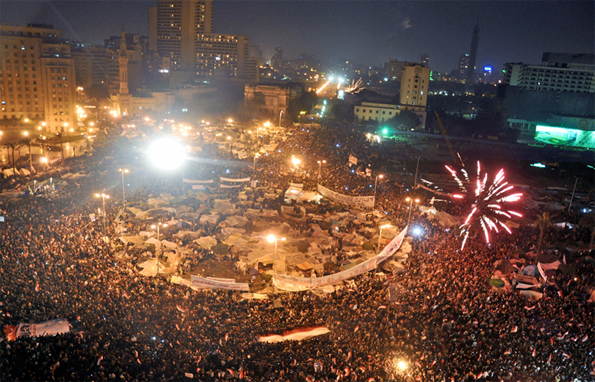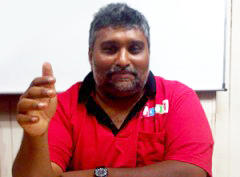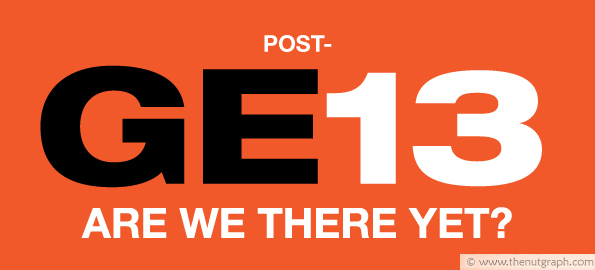
IT’s unclear how much of the Barisan Nasional (BN)’s win in the 13th general election since our independence (GE13) was due to fraud. It’s equally unclear how much was due to other breaches of electoral fairness — such as gross malapportionment of constituencies and skewed media coverage — and to cash handouts and divide-and-rule ideological projects.
Still, all of these actions make it clear that the BN has chosen to remain in the club of competitive authoritarian regimes. Such regimes differ in their strategies and locations, but they all abuse state resources to tilt the political playing field in their favour.
While some countries move from relatively democratic systems to more authoritarian ones, such as Malaysia in the 1970s, others have moved from authoritarianism toward democracy. What can the experiences of these other countries tell us about where we go from here? And what choices lie ahead of those who want change?
Waiting for the world to change?
In 2008, Malaysia’s opposition parties won an unprecedented share of parliamentary seats. Many were caught off guard, hence the term “political tsunami”. This year, many instead anticipated that we would experience a change in government — “Ini kalilah!” It’s tempting to think Pakatan Rakyat has lost its moment, or that GE13 was somehow a setback.
But political change is incremental, an accumulation of shifts in different actors’ perceptions and strategies. Even when revolutions erupt in a matter of days — as in the January 2011 Egyptian revolution against President Hosni Mubarak’s authoritarian rule — meaningful democratic change takes much longer.

In most cases, democratisation is gradual. Taiwan became democratic in 2000, when the DPP’s Chen Shui-Bian won the presidential election, ending the Kuomintang (KMT)’s 51-year authoritarian rule. By some accounts, Taiwan’s democratisation took decades: different scholars have pinpointed dates ranging from 1977 to 1992 as the watershed for its democratisation.1
All of this suggests that we should value the advancing steps of GE13 within a larger process of change. We saw our highest voter turnout in history. For the first time ever, BN did not win the popular vote, and the ruling coalition is even further away from a two-thirds majority than before. It was also the first general election in which DAP and PAS competed jointly in a formalised opposition alliance.
Another lesson on gradual timing is that authoritarian coalitions do not always fade politely into the background after they lose power. In Taiwan, the KMT regained the presidency in 2008 in a landslide victory, two elections later.

In Mexico, the 71-year reign of the Institutional Revolutionary Party (PRI) ended in 2000 when Vicente Fox of the National Action Party (PAN) won the presidential election. However, the PRI reclaimed the presidency two elections later, despite being levelled with accusations of fraud and money laundering.
Bersatu teguh, bercerai roboh
One reason why Mexico’s PRI reclaimed the 2012 presidential elections was that the anti-PRI vote was split between the market-oriented PAN and the left-wing Party of the Democratic Revolution (PRD). In fact, many believe that Fox won the 2000 presidential election because his centrist message attracted opposition voters across the political spectrum.
The importance of opposition unity is also clear in the work of political scientists Marc Morjé Howard and Philip G Roessler who analysed 50 elections in competitive authoritarian regimes. Their analysis found that the presence of an opposition coalition has the most impact in raising the likelihood that an election will bring significant political liberalisation.

There are obvious party-based tensions in Malaysia’s opposition movement. One example would be the longstanding differences between DAP and PAS about hudud law. Another is PKR’s and PAS’s refusal to give way to PSM candidates in Semenyih and Kota Damansara, respectively.
Nevertheless, the opposition movement has had growing success in drawing support across the colonial-era ethnic divisions that BN has perpetuated. But it isn’t quite as simple as replacing “Malay-Chinese-Indian” with “Malaysian”. For one thing, that effaces other other ethnicities — not least the Orang Asal, who constitute one-fifth of all bumiputeras.
There is also interplay between ethnicity and other types of difference. Many have argued that urban-rural differences were more important than ethnicity in GE13, whether because poverty is concentrated in rural areas or because online media access is concentrated in urban areas. The opposition will also have to build metaphorical bridges between East and West Malaysia, not least because of Sabah’s and Sarawak’s different ethnic and party configurations.
For the opposition, the challenge is not to deny these differences which together compose our fabulous cultural heritage. Instead, the challenge is to build broad-based support by flattening the social and material hierarchies which make one kind of difference superior to another.
For example, analysts have highlighted the urban-rural gap at least since the 1986 elections, when “the urban electorate tended to vote for opposition parties … while the rural electorate overwhelmingly voted for BN component parties”. Over the subsequent 27 years, if opposition parties had played a long game and sought to build inclusive coalitions — if PAS had worked to extend its rural base beyond the peninsular east coast; and if DAP had pressured the BN by championing rural issues alongside its other platforms — the 2013 election might have looked very different.
Beyond the middle ground
Where do pro-opposition, middle-class netizens fit in? Initially cast as key actors in what had been dubbed a “social-media election”, many are now among the most disillusioned after the election results.
Some of this disappointments stem from the assumption that Malaysia’s democratisation would be rapid. But some also stem from the assumption that recent political and economic changes had made it easier for all Malaysians to pick their political alignments freely. Unfortunately, this is not the case. Apart from the fact that internet access is still a limited commodity in many rural areas, middle classes enjoy other advantages.
 Exit polls found that roughly 70% of overseas postal voters surveyed in Melbourne and London voted for the opposition. However, it’s much less risky to vote for the opposition when you can watch the fall-out from a distance, or if you have the human or financial capital to migrate if post-election politics gets too messy. It’s much harder when you’re a civil servant under a pro-BN boss, or a farmer hoping for government aid to get you through a bad harvest.
Exit polls found that roughly 70% of overseas postal voters surveyed in Melbourne and London voted for the opposition. However, it’s much less risky to vote for the opposition when you can watch the fall-out from a distance, or if you have the human or financial capital to migrate if post-election politics gets too messy. It’s much harder when you’re a civil servant under a pro-BN boss, or a farmer hoping for government aid to get you through a bad harvest.
Additionally, it’s much easier to post Facebook statuses condemning the general corruption and NEP abuses that are affecting your earning prospects. It’s harder to protest against the crony contractor who refuses to connect your village’s electricity supply, or against the officials who are evicting you to make way for “development” projects. There is much less safety-in-numbers for resisting localised exploitation.
Indeed, if we are serious about democratisation in Malaysia, it will cost much more than a flow of tweets or multiple demonstrations and opposition ceramah. Those who can must invest time and money in initiatives such as Radio Free Sarawak, one of the only offline alternative media sources leading up to the elections. We must actively and respectfully pursue unity, rather than blaming government officers, “uneducated” rural voters, or underprivileged people from other countries who are hoping for better lives in Malaysia. We must also educate ourselves – the brokenness of our electoral system does not exempt me from the responsibility of learning about all the candidates on my ballot.

And we must persist in these investments, not only as we work toward meaningful democracy, but even after we achieve it. Change will come, but its speed and direction depend on all our choices. ![]()
[1] See Shelley Rigger, Politics in Taiwan (Voting for Democracy. London: Routledge, 1999), p.182; and Chu Yun-han and Lin Tse-min, ‘The Process of Democratic Consolidation in Taiwan,’ in Tien Hung-Mao ed., Taiwan’s Electoral Politics and Democratic Transition: Riding the Third Wave (Armonk, New York: M.E. Sharpe, 1996), p.81.
Hwa Yue-Yi recently completed a master’s thesis in anti-authoritarian mobilisation in Malaysia and Singapore. In the near future, she aims to educate herself by learning more about politics in Sabah and Sarawak, and reading an English paraphrase of the Quran.


Long knives says
There is so much fear from the-powers-that-be that united Malaysians who transcend race and religion will no longer require the self-elected leaders that have long ruled the country through divide-and-conquer. These individuals are making every effort to slow the reforms demanded by the people. From fraud in elections to outright theft of the peoples’ choice, [nothing] goes unnoticed.
Gopal Raj Kumar says
When you say “it is unclear” you make the point you have no evidence of any sustainable or admissible nature to support the innuendo. To repeat an unsustainable lie is to bring yourself and your publication into disrepute.
If there was fraud, if there was unfairness and an absence of transparency then as the challenge has been put to the opposition before, they ought to resign their seats and give it up to reinforce their “”higher than BN morals”.
If the elections were not free, not fair and the BN victory induced by fraud, it flows logically from that statement that the oppositions victories are just as tainted with that fraud, unfairness and absence of transparency. it can’t only be for one side. The election commission handled the elections did they not?
Kong Kek Kuat says
@ Gopal Raj Kumar
You might want to consider posting your opinion to some other mass media outlet, such as Utusan Meloya rather than TNG, because you´d be moving the masses with your views over there.
Gopal Raj Kumar says
Dear Mr. Kong,
I thank you for your response above which vindicates the position I and many others (in a proved majority) have adopted over views you and The Nut Graph have pursued and continue to pursue.
[…]
I am open to a discussion or argument if you can prove the facts or at the very least present an arguable case.
The Nut Graph after all supports a more “robust democracy” and freedom of expression, equality and all those egalitarian and pluralistic principles you wax lyrical on with each new issue. So why the need to shoot the messenger?
I do not vote in Malaysia. I have the luxury of being an observer and a keen one at that. The ‘black or white arguments’ (the much discredited George Bush equivalent of “he who is not with us is against us”) you present demonstrates a level of hollowness […].
Let the Utusan speak to their readers, I do not write in Bahasa Malaysia. I am free to submit my views here subject to your democratic and free-thinking editorial discretion to censor me like you do from time to time.
[…]
Kong Kek Kuat says
@ Gopal Raj Kumar
Masyaallah…you don´t even write in Malay and vote in Malaysia? Then you have nothing to contribute to Malaysia. Maunam, thambi. (In case you don´t even write in Tamil, it means “silence”.) You may as well be an Indian Malaysian married to a foreigner trying to survive in a foreign country, say Melbourne, Australia.
Oh, BTW, the last I checked, the views I and The Nut Graph have are part of the bigger view of about more than half of the people who had voted in the last elections. So, let me try to break it down for you: You were not shot as a messenger, as if you ever were; you were merely casually dismissed, as if you were irrelevant. Kalai vaanaakam from Malaysia (Good morning from Malaysia).
JW Tan says
This is laughable.
Electoral fraud, vote buying, unfree elections are normally meant to benefit one side, usually the incumbent. I can’t think of any instances where electoral fraud has benefited both sides, to the extent that the election was actually fair. Let’s have some examples from you please, if you disagree.
The opposition has won what it has in spite of fraud and sharp practices, not because of it. Why should they resign their seats to give the perpetrators of fraud what they wanted in the first place? To do so would be immoral, not to say cowardly.
Gopal Raj Kumar says
It appears that only Anwar, you and Ambiga saw the fraud and vote-buying like the bashing up of the Bengali workers by an opposition lynch mob in the misguided belief that they were being shipped illegally to voting booths.
The ABC’s Jim Middleton, a long time advocate and friend of Anwar Ibrahim, his daughter and his wife, stopped advocating Anwar’s ridiculous claims that the elections had been stolen on the night of 5 May 2013. In utter embarrassment, Middleton dropped the coverage of the Malaysian elections for his programme when Anwar claimed victory decisively and hours prior to the booths being closed for counting.
[…] When it became apparent to Anwar that his claim to electoral victory was premature, he made that utterly incredulous and totally unnecessary statement that the elections had been stolen without the ability to show an iota of proof for his assertions.
Such was the strategy adopted by a bunch of losers. They began with the premise that if they lost it would be because the elections were stolen. What they failed to understand about their absurd claims was that they were shooting themselves in the foot.
If the elections were rigged, they were rigged. If they were rigged, the entire process was tainted. They are therefore riding on the victory of a tainted process where they claimed victory. On that basis they ought to resign their seats to prove the sincerity of their claims.
[…]
JW Tan says
Do you actually have any evidence for any of your assertions? Because some of them are simply ridiculous.
It’s clear that there are major question marks about the electoral process. From indelible ink that you have to wash off in case it smears your clothes, to cases of voters voting multiple times (someone even tried it as an experiment), to cases of foreign nationals somehow possessing NRD documents that enable them to get on the electoral roll in competitive constituencies. All this is easy to see, all one needs is a few minutes on Google.
What is not clear is whether any of this could have influenced the outcome of the elections. I doubt this myself, but given the incidents, I am willing to give PR the benefit of the doubt.
Again, I have to question the morality of your assertion that the opposition should resign their seats simply because the process was tainted. Who will look after the people’s, and the country’s interests then? Certainly not BN. Better they be looked upon as hypocrites by people like you than fail to fulfill their responsibilities as elected representatives of people like me.
Adam says
That last paragraph does not make much sense. In any contest, if one side is caught cheating, the other side would be declared the victor. The contest should not be replayed. If a replay is allowed, then everyone would try to cheat.
On the other hand, if the rules of a contest are found to be unfair to any side, the referee could declare the contest void and a replay could then be called with new rules.
It would be another story when one side cheats with the aid of the referee. Oops…that sounds familiar. Some football matches maybe?
Gopal Raj Kumar says
Then one has to prove to the referee that cheating occurred. Ambiga and Anwar have been challenged even by their allies who support them from abroad to show conclusive evidence that is admissible in a court that cheating occurred, and they remain silent.
Other than to make bold statements of cheating and corruption, they have nothing else to show for those statements. It’s a pity because those who read criticisms of Anwar and Ambiga’s behaviour in this regard immediately believe that those who challenge them are against them and for the Barisan.
[…]
Adam says
Well, when the referee is on the other side and has refused to entertain complaints, and the linespersons are also taking instructions from the referee, what can the voters do but to protest publicly through the Black 505 rallies while waiting for the election results to be gazetted. I wonder what Anwar and Ambiga were doing during those rallies. Remaining silent?
Let us wait and see what evidence will be produced before the courts. Revealing too much now would give these people the opportunity to cover their tracks.
And yes, the EC has cheated the urban voters. The votes of urbanites have been devalued so much that their votes are only worth a fraction of those in the rural constituencies. Is this democracy, where the basic principle of one person one vote should reign supreme? They may say that it is perfectly legal after the 15% limit has been removed from the constitution but is it right? When such an amendment is against the spirit of the constitution, it should be declared null and void. Any layperson can sense that, what more a lawyer?
My old generation is partly to blame for not protesting these unjust amendments but our young generation should and must take back the control and destiny of our beloved country. Only those with their own selfish agenda would not want the best for the nation.
DL says
“Where do pro-opposition, middle-class netizens fit in?”
Excellent question! I think the answer is partly to just stay informed and knowledgeable on issues. Especially the malapportionment of constituencies! The opposition stands to gain several seats just by making constituencies equal in size.